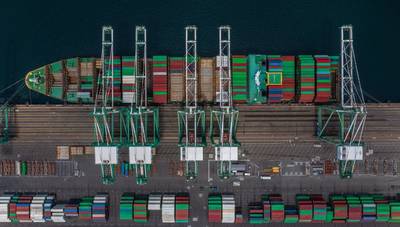Global Supply Pressures May Be Nearing Peak
The historically high pressures on global supply chain networks that have contributed to shortages of key goods and materials and a surge in inflation may have peaked, according to a new index released by the New York Federal Reserve on Tuesday.
The Global Supply Chain Pressure Index (GSCPI) surged early in the pandemic when China imposed lockdown measures. Pressures eased as production resumed but picked back up during the winter of 2020 as COVID-19 infections jumped.
"More recently, the [index] seems to suggest that global supply chain pressures, while still historically high, have peaked and might start to moderate somewhat going forward," the researchers wrote in a blog post here.
The index is based on 27 variables such as shipping rates and air freight costs between the United States, Asia and Europe. Researchers found “enormous growth” in shipping costs since the beginning of the recovery from the lows at the start of the pandemic. But that growth has started to slow in recent months.
The researchers also noted that container shipping rates rose more significantly during the most recent economic recovery than after the Global Financial Crisis. But the costs of shipping raw materials, such as coal or steel, rose “on par” with the post-GFC recovery, they added.
Researchers said they adjusted for shifts in demand, but noted that the index is “not a perfect” measure and likely still reflects some demand factors.
The index, drawing on data going back to 1997, shows global supply chain pressures are substantially higher now than in previous times of stress.
For example, pressures rose in 2011 after two natural disasters, including an earthquake in Japan and flooding in Thailand. The index rose again during the U.S.-China trade war in 2017 and 2018. But those spikes “pale in comparison to what has been observed since the COVID-19 pandemic began,” researchers wrote.
A separate report out Tuesday suggested that supply constraints are starting to ease as delivery times improve. The Institute for Supply Management (ISM) survey also found that prices paid by manufacturers fell last month by the most in a decade.
But the survey did not fully capture the effects of the Omicron COVID-19 variant, which could cause some workers to stay home and reverse some of the progress in supply chains.
Fed officials are closely monitoring supply chain disruptions as they devise a plan for withdrawing monetary support offered during the pandemic.
Minneapolis Fed President Neel Kashkari said on Tuesday he now saw the central bank raising interest rates twice this year in response to higher inflation, noting he was unsure how long it would take to resolve supply side imbalances caused by the pandemic.
(Reuters - Reporting by Jonnelle Marte; Editing by Richard Chang)













